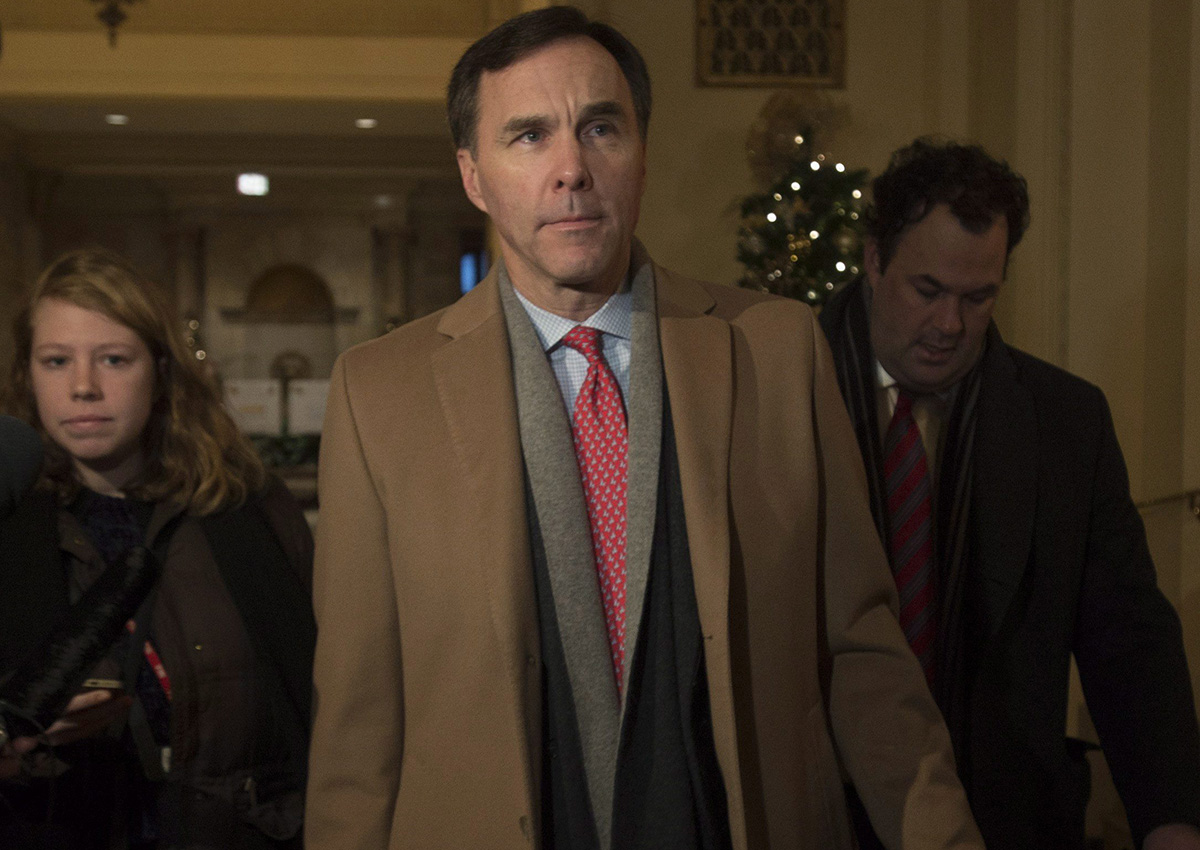The company that made Finance Minister Bill Morneau his millions before he leapt into federal politics in 2015 stands to benefit if Ottawa delays its promise to review treaties with several small Caribbean nations that have long served as tax havens.

Morneau Shepell, an HR consulting and pension management firm, was founded by Morneau’s father, and the finance minister served as its executive chair until October 2015, when he was elected in the riding of Toronto Centre.
READ MORE: CRA expects to track down $400M in tax crackdown
Morneau severed his corporate ties following his win, but he may maintain shares in the company to this day in a blind trust.
About a year after the Liberals formed government, in October 2016, a Bahamian subsidiary of Morneau Shepell — listed as Morneau Shepell (Bahamas) and fully owned by the parent company — moved its corporate registration to Barbados. No public reason was given for the change.
But basing operations in either of those Caribbean nations is potentially beneficial for Morneau Shepell at tax time, thanks to special treaties and agreements with Canada that Morneau himself is now helping to review.
A tax treaty negotiated by Ottawa in 1980 makes setting up subsidiaries in Barbados very attractive to Canadian companies, for instance, and the island remains a favourite destination for corporations like Morneau Shepell.
Overall, Canadian corporations held nearly $80 billion in assets there in 2015.
WATCH: Morneau says use of private corporations to lower tax rates is ‘increasing’

By funnelling their international profits to Barbados-based subsidiaries, corporations can take advantage of the country’s ultra-low tax rates (as low as one to 2.5 per cent) and lack of transparency on corporate ownership. Then, thanks to the treaty, they never have to pay the much higher Canadian corporate rates when the income is “repatriated” back home.
Morneau Shepell’s corporate headquarters has always maintained that their subsidiary in the Bahamas/Barbados is a legitimate business set up to extend pension consulting services to governments in the Caribbean and that at no time is it used to funnel profits or avoid taxes in Canada.

Get daily National news
READ MORE: Why doesn’t Canada measure the ‘tax gap?’
Dennis Howlett of Canadians for Tax Fairness says his organization’s own probe into the matter last year supports that claim.
“It would appear that it would have economic substance,” he said Wednesday. “We determined that it was not a case where they were setting up a subsidiary in order to shift profits.”
Conflict of interest?
But regardless of his now-severed links to his family’s business, some of Morneau’s decisions as finance minister may now be benefiting the company’s subsidiary down in the Caribbean — or at the very least affecting it, which presents the real possibility of a conflict of interest.
Morneau is currently helping to steer a national working group that could require actual company owners — or “beneficial” owners — to list themselves in their corporate registrations. But the working group will also apparently be looking into how to tackle offshore tax avoidance in countries that have a tax treaty with Canada.
In a July interview with the Toronto Star, Morneau noted that any changes to tax treaties, which would directly affect his former company’s subsidiary, may take some time.
Such change “requires us to do some work,” Morneau said. “We’re going to do that work. But we’re not going to throw the baby out with the bathwater.”
This all comes at an awkward time for the embattled finance minister, who has been trying to sell a controversial series of tax measures to Canadians that he says will ensure everyone pays their fair share.
WATCH: Manitoba premier calls small business tax plan ‘class warfare’

A month before Morneau Shepell transferred its business from the Bahamas to Barbados in late 2016, the Toronto Star reported that Morneau was still listed as the director of the Bahamian subsidiary.
The minister’s office, in response, provided documents proving he had resigned a year earlier, as required by law. The resignation had apparently not yet been recorded in the Bahamian corporate registry because of “clerical delays.”
In a statement sent to Global News on Wednesday, a spokesperson for the finance minister reiterated that Morneau has broken no rules since taking office.
“Prior to being sworn-in, the minister officially resigned from all boards and has worked with the Ethics Commissioner to ensure all conflict of interest rules are followed,” wrote Daniel Lauzon.
“He has been open about all activities related to his former business career. Appropriate measures and screens have been put in place in order to fully comply with the recommendations provided by the Ethics Commissioner.”
READ MORE: New revelations about Canadian ties to Bahamas tax haven
But Howlett says Morneau’s involvement in any decisions surrounding tax treaties remains problematic.
“There are special arrangements for Barbados that in our view, are not good. And if he is involved in making decisions about the Barbados tax treaty, that could be a conflict,” Howlett said.
He added that this is especially true if Morneau still owns shares in Morneau Shepell in a blind trust. In October 2015, Morneau held two million shares in the company, valued at $32 million. His office had no comment on the status of those shares on Thursday.
— With files from Bryan Mullan








Comments